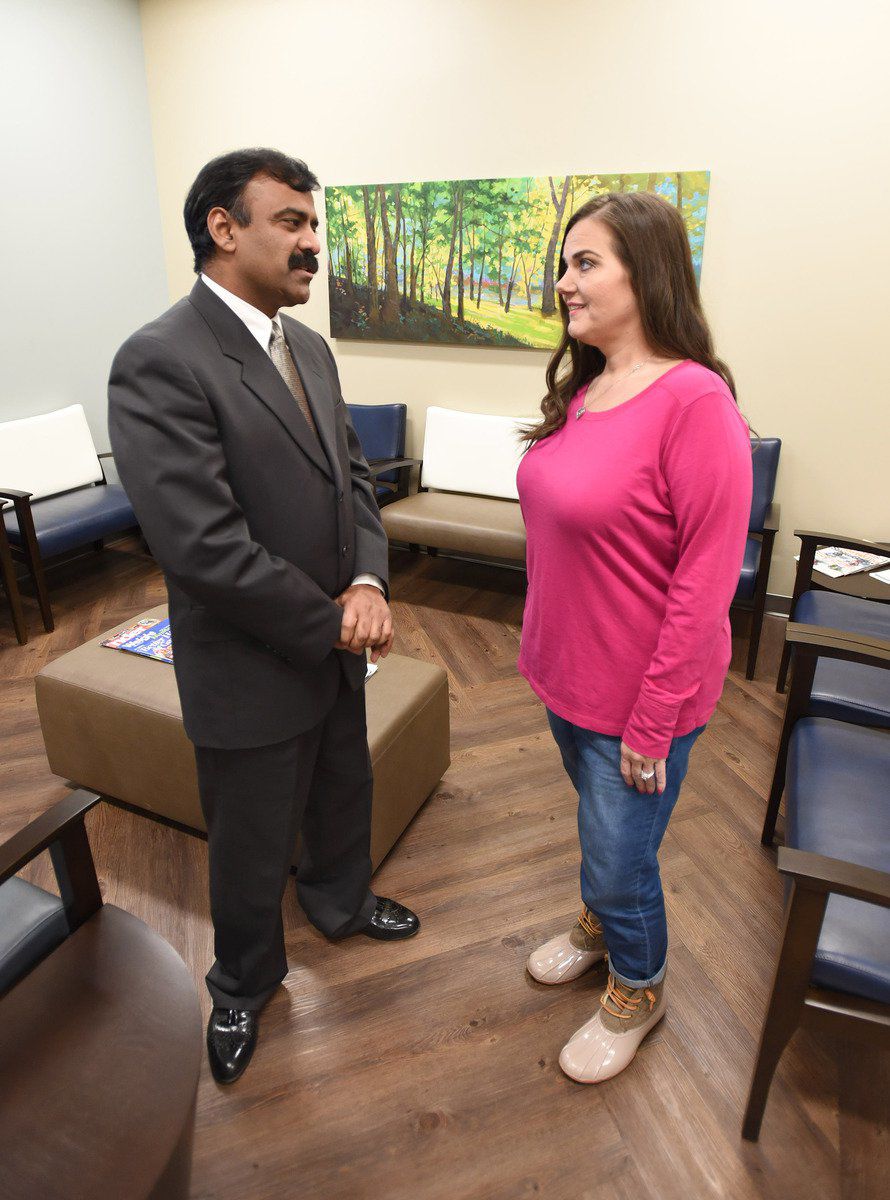Published on April 03, 2020
Tammi Jackson's Patient Story
Shedding the Pounds
By Renee Beasley Jones, Messenger-Inquirer

Dr. Ravi Alapati, left, talks with his surgical weight-loss patient Tammi Jackson of Union County on Thursday who has lost 115 pounds since her surgery.
Since kindergarten, Tammi Jackson's weight bothered her.
Jackson, 46, of Union County, started dieting in fifth grade. Her mom monitored Jackson's meals and took her on long walks in the hopes she would lose a few pounds.
Jackson stands 5 feet 4 inches. At her heaviest, she weighed 292 pounds.
At her grandson's birthday party in 2017, she ate most of his cake.
She could eat an entire cheesecake by herself. "If it was there, I couldn't stop myself from eating it until it was gone."
Jackson couldn't stand long enough to wash a sink full of dishes. She struggled to walk to the bathroom.
She was diagnosed with prediabetes, polycystic ovarian syndrome, asthma, depression, anxiety and degenerative disc disease.
"I was dying a slow death," she said.
Until Dec. 31, 2018. That's when she had gastric bypass surgery at Owensboro Health.
She hasn't eaten sweets since.
"We've had a year of birthdays, and I haven't had one bite of cake," Jackson said with a wide grin.
She doesn't even crave candy, cake or pie anymore.
On Dec. 12, she weighed 177 pounds.
She walks up to 5 miles a day. She pushes her grandson on his bike and goes camping.
Jackson has a bucket list that includes skydiving and ziplining. "I made up my mind that once I did this I would say yes more. No isn't an option for me now."
When she decided to have weight-loss surgery, she thought she'd have to travel to Louisville or Nashville, but her family physician told her OH had just started a program.
Dr. Ravi Alapati, a general surgeon who specializes in bariatric surgery and minimally invasive procedures, joined OH last year. Before coming to the health system, he practiced at Digestive Care Center in Evansville and built a bariatric program from the ground up in Pennsylvania.
At Jackson's first meeting with Alapati, he interacted with her son and other family members. When it was time to talk with Jackson, Alapati pulled his chair in close and sat knee-to-knee with his patient, giving her his full attention.
"He is not my surgeon," Jackson said. "He is my family."
OH's new surgical weight loss program has grown faster than Alapati imagined. By the end of November, the new program had performed 194 surgeries.
During the program's first year, his patients lost a total of at least 7,000 pounds, according to staff estimates.
His goal: Alapati plans for the surgical weight loss center to become a Center of Excellence by the summer of 2020. The nearest program that has earned that certification is in Nashville, Tennessee.
In bariatric surgery, leaks present a risk. Nationwide, 2.6% of sleeve surgeries experience leaks, and 1.2% of gastric bypass surgeries leak, statistics show. Owensboro Health had no leaks and no deaths during its first year, Alapati said.
"The reason is the way we have set up the program," he said.
First, patients are screened for existing heart, lung, kidney and neurological problems.
In addition, the program has a dedicated nutritionist and psychologist, and the OH Regional Hospital's nursing staff is well trained to meet the needs of patients who are admitted for weight-loss surgery.
For the first year after surgery, patients are watched closely. They return for visits at two weeks, five weeks, three months, six months and one year.
After that, they make annual visits.
Keeping weight off requires more than surgery, Alapati said. Patients must be dedicated to diet and lifestyle changes.
As a result of surgical weight loss and lifestyle changes, Alapati said, he has seen patients reverse the effects of many diseases and disorders, such as sleep apnea, Type II diabetes and hypertension reflux. Many patients are able to stop taking medications.
"I've had patients who came in with three different medications and insulin," he said. "They are not on medications anymore."
Many of his patients are on vitamin supplements only.
"They feel like a new person," Alapati said.
On Nov. 15, Jackson attended the Owensboro Health Best Self Ball. She told a crowd of about 200 people about the ways in which weight loss transformed her life.
Her feelings can be capsulized in one sentence: "(Alapati) saved me," Jackson said.
Renee Beasley Jones, 270-228-2835, rbeasleyjones@messenger-inquirer.com
About Owensboro Health
Owensboro Health is a nonprofit health system with a mission to heal the sick and to improve the health of the communities it serves in Kentucky and Indiana. The system includes Owensboro Health Regional Hospital, nationally recognized for design, architecture and engineering; Owensboro Health Muhlenberg Community Hospital; Owensboro Health Twin Lakes Medical Center; the Owensboro Health Medical Group comprised of over 350 providers at more than 30 locations; four outpatient Healthplex facilities, a certified medical fitness facility, the Healthpark; a weight management program, and the Mitchell Memorial Cancer Center.
On average each year, we have more than 19,000 inpatient admissions, deliver 2,000 babies and provide the region’s only Level III NICU. Owensboro Health physicians perform nearly 33,000 surgical procedures, including nearly 150 open-heart surgeries. Our physicians and staff have 90,000 Emergency Department visits and more than 1.25 million outpatient visits annually. Visit our home page for more information.